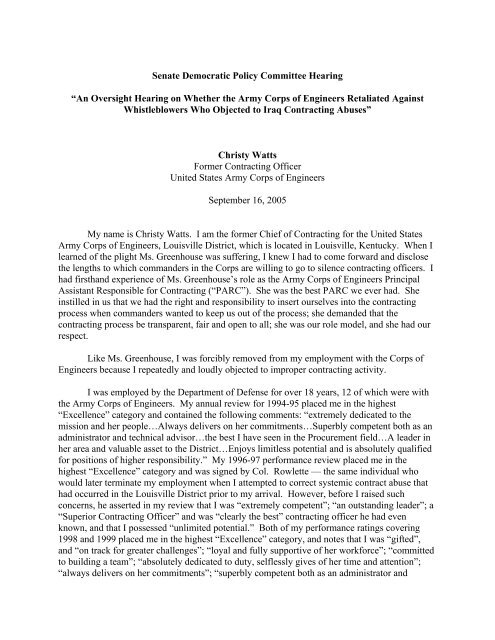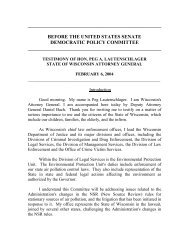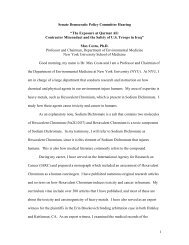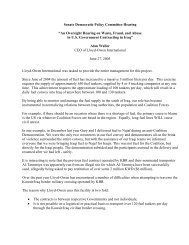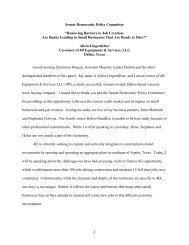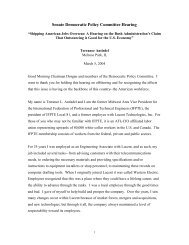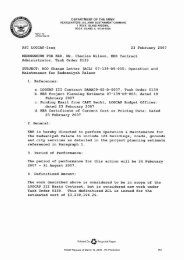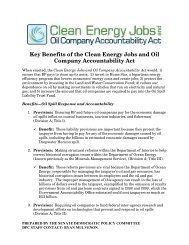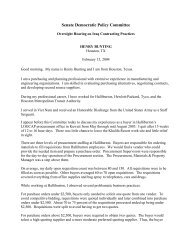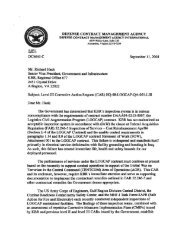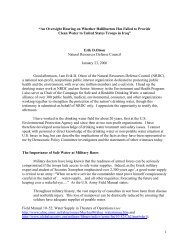Christy Watts - Democratic Policy & Communications Center
Christy Watts - Democratic Policy & Communications Center
Christy Watts - Democratic Policy & Communications Center
Create successful ePaper yourself
Turn your PDF publications into a flip-book with our unique Google optimized e-Paper software.
Senate <strong>Democratic</strong> <strong>Policy</strong> Committee Hearing<br />
“An Oversight Hearing on Whether the Army Corps of Engineers Retaliated Against<br />
Whistleblowers Who Objected to Iraq Contracting Abuses”<br />
<strong>Christy</strong> <strong>Watts</strong><br />
Former Contracting Officer<br />
United States Army Corps of Engineers<br />
September 16, 2005<br />
My name is <strong>Christy</strong> <strong>Watts</strong>. I am the former Chief of Contracting for the United States<br />
Army Corps of Engineers, Louisville District, which is located in Louisville, Kentucky. When I<br />
learned of the plight Ms. Greenhouse was suffering, I knew I had to come forward and disclose<br />
the lengths to which commanders in the Corps are willing to go to silence contracting officers. I<br />
had firsthand experience of Ms. Greenhouse’s role as the Army Corps of Engineers Principal<br />
Assistant Responsible for Contracting (“PARC”). She was the best PARC we ever had. She<br />
instilled in us that we had the right and responsibility to insert ourselves into the contracting<br />
process when commanders wanted to keep us out of the process; she demanded that the<br />
contracting process be transparent, fair and open to all; she was our role model, and she had our<br />
respect.<br />
Like Ms. Greenhouse, I was forcibly removed from my employment with the Corps of<br />
Engineers because I repeatedly and loudly objected to improper contracting activity.<br />
I was employed by the Department of Defense for over 18 years, 12 of which were with<br />
the Army Corps of Engineers. My annual review for 1994-95 placed me in the highest<br />
“Excellence” category and contained the following comments: “extremely dedicated to the<br />
mission and her people…Always delivers on her commitments…Superbly competent both as an<br />
administrator and technical advisor…the best I have seen in the Procurement field…A leader in<br />
her area and valuable asset to the District…Enjoys limitless potential and is absolutely qualified<br />
for positions of higher responsibility.” My 1996-97 performance review placed me in the<br />
highest “Excellence” category and was signed by Col. Rowlette — the same individual who<br />
would later terminate my employment when I attempted to correct systemic contract abuse that<br />
had occurred in the Louisville District prior to my arrival. However, before I raised such<br />
concerns, he asserted in my review that I was “extremely competent”; “an outstanding leader”; a<br />
“Superior Contracting Officer” and was “clearly the best” contracting officer he had even<br />
known, and that I possessed “unlimited potential.” Both of my performance ratings covering<br />
1998 and 1999 placed me in the highest “Excellence” category, and notes that I was “gifted”,<br />
and “on track for greater challenges”; “loyal and fully supportive of her workforce”; “committed<br />
to building a team”; “absolutely dedicated to duty, selflessly gives of her time and attention”;<br />
“always delivers on her commitments”; “superbly competent both as an administrator and
technical advisor”; possessed “unlimited potential” and was an obvious “S[enior] E[xecutive]<br />
S[ervice] candidate.” My performance appraisal for 2000-01 again placed me in the highest<br />
“Excellence” category and noted: “Always delivers on her commitments”; and was “extremely<br />
dedicated to the mission and her people”; “superbly competent both as an administrator and<br />
technical advisor”; that I possessed “unlimited potential”; and that I was a “leader in her area<br />
and valuable asset to the District.”<br />
I arrived at the Louisville District in June 2001 as the Chief of Contracting, and had<br />
previously held the position of Chief of Contracting at two different Districts under six different<br />
commanding officers, all of whom acknowledged that my performance was extraordinary. Soon<br />
after I arrived at the Louisville District, I realized that significant improper and illegal<br />
contracting practices had been ongoing at the District for a long period of time. I reported such<br />
contracting abuse to my District Commander’s attention. When I attempted to raise contracting<br />
irregularities during an executive board meeting held at the District, Robert Fuller, the Chief of<br />
Operations, blew up and began screaming at me. I then met in private with the District<br />
Commander and explained that the scope of contract irregularities I was uncovering were<br />
mushrooming.<br />
On an annual basis, I was required to certify to the District Commander whether there<br />
were any material weaknesses. I concluded that weaknesses existed and issued a detailed<br />
accounting of the material weaknesses related to the contract irregularities that I had uncovered.<br />
However, the Commander failed to forward my 2002 certification of material weaknesses to<br />
Division Command, nor were they sent to Headquarters. In April of 2002, I met with the District<br />
Chief Counsel, Dale Holmes, to discuss the contract irregularities. I explained to Mr. Holmes<br />
that the contracting irregularities constituted illegal activity and discussed with him the<br />
significance and wide-spread nature of the contracting abuse and stated that the illegality should<br />
be brought to the attention of the Department of Defense (“DOD”) Office of Inspector General<br />
(“IG”) for investigation. Mr. Holmes stated that doing so could have adverse consequences for<br />
the District and that DOD should not be contacted.<br />
In July 2002, Col. Rowlette became the commander of the Louisville District. After I<br />
expressed my concerns over contract illegalities, Col. Rowlette removed me as a member of the<br />
District’s Board of Directors. In August 2002, I transmitted a three-page summary of the known<br />
contracting irregularities to my commander, Col. Rowlette, and deputy commander, Lt. Col.<br />
Fagan, requesting that I be authorized to initiate an audit by the Army Audit Agency (“AAA”) in<br />
order to get to the bottom of the problem. This request was denied.<br />
By September 2002, I began to experience significant retaliation for attempting to<br />
uncover and correct contract abuse that had occurred in the District. On September 16, 2002, I<br />
was issued a counseling statement claiming my performance was lacking and I was called before<br />
the Deputy Commander the following day. During the course of my counseling session, I was<br />
specifically told by the Deputy Commander that I was not free to consult with my contracting<br />
chain of command when I disagreed with contracting positions taken by the Command unless I<br />
obtained the approval of the Command.<br />
2
Improper Interference with Contracting Officer’s Ability to Seek Guidance<br />
from the Army PARC<br />
The following is a transcript excerpt that reflects a tape recording of the conversation I<br />
had with my Deputy Commander on September 17, 2002 as part of a counseling session:<br />
* * *<br />
Fagan: You are not going outside of our office of counsel. On a case by case basis you can go<br />
outside after you clear it through me or the Colonel cause . . .<br />
<strong>Watts</strong>: Are you telling me that I cannot talk to my stovepipe without talking to you first? Is that<br />
what I=m hearing?<br />
Fagan: If you disagree with a legal opinion that our office of counsel has, no you cannot go<br />
outside of our district. You don=t go to your stovepipe unless you talk to us about it and<br />
we will decide whether or not you can go outside the district.<br />
<strong>Watts</strong>: Are you saying a legal opinion is gospel?<br />
Fagan: I’m saying that a legal opinion is sufficient for you to do a contract or whatever.<br />
<strong>Watts</strong>: So what you’re telling me is that whatever…So what I just heard you say is that whatever<br />
legal says means I just have to sit down and shut up and sign it.<br />
Fagan: No, I didn’t say that.<br />
<strong>Watts</strong>: That is what I just heard you say.<br />
Fagan: . . . If you disagree. . .<br />
<strong>Watts</strong>: Please explain to me what you just said.<br />
Fagan: If you disagree. . . If you disagree with a legal opinion or legal sufficiency statement,<br />
then by a case by case basis you can bring it to me, the Colonel or Dr. Mullin, and we<br />
will tell you whether you can go outside the district.<br />
* * *<br />
<strong>Watts</strong>: I have a right to ask my stove pipe for guidance.<br />
Fagan: After you talk to the Colonel or me and we will make the decision because we are not<br />
going to go through this again. . .<br />
3
* * *<br />
<strong>Watts</strong>: So you’re telling me whether I can or cannot go ask my stovepipe for guidance.<br />
Fagan: That is exactly right, we are telling you that.<br />
* * *<br />
The interference with my ability to freely communicate with my contracting chain of<br />
command was improper and violated the June 2, 1993, directive of the then-Undersecretary of<br />
Defense, John M. Deutch, who issued a memorandum stating: “A good working relationship<br />
among all personnel involved in [the contracting] process is critical for the efficient and effective<br />
meeting of our defense needs” and that, in order to accomplish this, contracting officers must be<br />
able to “act independently without improper influence on business decisions.” Preventing me<br />
from freely contacting my contracting chain of command was done in an effort to interfere with<br />
the independence contracting officers are required to exhibit, and was aimed at preventing me<br />
from providing business advice the Command simply did not want to hear.<br />
The level of distaste that commanders who are part of the “good old boys” network have<br />
for contracting officers who have the conviction to object to improper contract activity is<br />
captured in a memo the District Deputy Commander, Lt. Col. Fagan, sent from Iraq after he<br />
learned I had to take sick leave (due to health problems I began to experience as a result of the<br />
tremendous stress and hostility I was forced to work under). In that memo Col. Fagan states: “I<br />
guess we can’t do [to <strong>Christy</strong> <strong>Watts</strong>] what I did when my mare broke her leg, can we?” A copy<br />
of this memo is also attached to my testimony. The impropriety associated with the making of<br />
this comment by a superior officer, a white male tied in to the “good old boys” network, is<br />
obvious. Yet, no formal or informal disciplinary action of any kind was taken against Lt. Col.<br />
Fagan for making this statement.<br />
Undue Influence on a Contracting Officer — Attempt to Obtain an Unlimited Warrant<br />
for Use in Iraq<br />
On May 13, 2003, I was summoned to Col. Rowlette’s office to discuss the granting of an<br />
unlimited warrant to Joe Theobald, who the District planned to send to Iraq. Mr. Theobald was<br />
the former chief of contracting and was directly responsible for all of the illegal contracting<br />
actions I had uncovered. However, the protocol to obtain an unlimited warrant required the<br />
Command to obtain my concurrence. I advised the Command that I could not, in good<br />
conscience, grant an unlimited warrant to someone I knew to be responsible for a decade’s worth<br />
of serious contract abuse, most of which the Command would not let me investigate. I had no<br />
alternative but to not concur to the request for an unlimited warrant. The Command then<br />
attempted to circumvent the requirement for my approval and sought to obtain approval without<br />
having to go to the Principle Assistant Responsible for Contract (“PARC”), Ms. Greenhouse.<br />
However, the warrant issue eventually went to Ms. Greenhouse. Ms. Greenhouse concluded that<br />
I “appropriately provid[ed] her statement of serious reservations about Mr. Theobald’s business<br />
4
acumen and judgment in correspondence to issues that the references validate that she and the<br />
District Counsel had to address within the first 6 months of her tenure and are still addressing.”<br />
Ms. Greenhouse went on to note that the “myriad of issues that were surfaced by Ms. <strong>Watts</strong> in<br />
her analysis of the health of contracting in the District should be enlightening for you as<br />
Commander to ensure that the entire Project Management Team finds remedies therefore to<br />
ensure that these issues…are eradicated and not repeated again. Some of the improprieties, even<br />
though validated by Counsel, appear not to have been aggressively fixed.”<br />
I was summoned into a meeting at which time I was told that, if I failed to approve the<br />
warrant for Mr. Theobald, the Command would select one of my employees to go to Iraq and fire<br />
that individual when they refused to go. I was told that I could avoid this if I just approved the<br />
warrant request for Mr. Theobald. This conduct on the part of Col. Rowlette, a commissioned<br />
officer in the United States Army, clearly demonstrates an attempt to engage in the undue<br />
influence of a contracting officer.<br />
The mindset of the Command is further depicted in a memo issued by the Deputy<br />
Commander of the Louisville District, Lt. Col. Fagan, to the District Commander, Col. Rowlette<br />
regarding the Theobald warrant issue. This memo depicted Ms. Greenhouse as someone who<br />
would “set up” the Command in that she would “stack the deck” with inspectors who could<br />
make the Command “look really bad, if all the problems are found that I think they will find.”<br />
The memo explains that “we actually had a pretty good and workable solution until our KO<br />
[contracting officer] got involved” and that the real issue was that contracting officers could<br />
overstep the will of a commander. The memo states: “I am bothered by the command issues<br />
here. Commanders command, and staff officers make recommendations to Commanders. We<br />
have a couple of staff officers [i.e., myself and Ms. Greenhouse] making decisions for the<br />
commanders.” A copy of Lt. Col. Fagan’s memo is attached to my testimony. In a separate<br />
memo, Lt. Col. Fagan stated that, with respect to the ability to grant or deny Mr. Theobald a<br />
warrant, “one person [Ms. Greenhouse] should not have this much control and (power?).” A<br />
copy of this memo is likewise attached.<br />
Undue Influence on a Contracting Officer — Forcing a Contracting Officer to Sign<br />
Documents That He or She Cannot Sign in Good Conscience<br />
The Louisville District was in the process of procuring a $500 million-plus contract<br />
related to the Olmsted Dam project. I was the contracting officer for this procurement process<br />
until I objected to Col. Rowlette’s desire to modify the solicitation. He ultimately issued a<br />
written order directing me to change the solicitation when I was not prepared to do so. It was<br />
obvious that if I did not comply with his directive to sign the document, I would be summarily<br />
relieved of duty. So I did the only thing I could do, I signed the document. At that point I found<br />
myself in a very similar position to Ms. Greenhouse when she felt obligated to include a<br />
comment on documents related to the Restore Iraqi Oil contract. Like Ms. Greenhouse, I chose<br />
to hand-write on the document next to my signature. I indicated that I was signing this document<br />
under duress. A few weeks later I was removed as the contracting officer. Ultimately, I was<br />
placed on administrative leave pending my removal, at which time the contract was awarded<br />
5
without a proper evaluation being performed. I further learned that the Commander was going to<br />
personally work out the funding issues with the contractor after award. This activity by the<br />
Commander was simply improper.<br />
Removal from Iraq Electrical Infrastructure Contract<br />
In November 2003, the District became responsible for a contract to repair the Iraqi<br />
electrical infrastructure that had been awarded to Halliburton subsidiary KBR. If I recall<br />
correctly, the value of that contract was $1.1 billion. As the Chief of Contracting for the District,<br />
I would function as the contracting officer on all of the important contracting matters handled by<br />
the District. However, without any advanced warning, I was summoned into a meeting and told<br />
by my first line supervisor that I was being suspended for 5 days due to my handling of the<br />
Olmsted Dam project, and that I was also being removed as the contracting officer over the Iraq<br />
contracts. I was removed from the Iraq contracts because the District Command knew I would<br />
demand compliance with contracting requirements, and that my removal would alleviate the<br />
scrutiny that should have been applied.<br />
Requirement That I Not Contact the Office of Special Counsel With My Concerns<br />
The plight I encountered as a whistleblower in the Army Corps of Engineers was nothing<br />
short of traumatic. For the first time in my life, I was forced to seek medical assistance to deal<br />
with the stress. I continued to fight as long as I could. However, I eventually had little choice<br />
but to agree to accept a confidential settlement. Against my desire, the settlement agreement the<br />
Army Corps required me to sign included a provision that prevented me from disclosing<br />
concerns to the United States Office of Special Counsel. Paragraph 14 of the agreement drafted<br />
by the Army Corps specifically states:<br />
“<strong>Watts</strong> agrees not to contact the Special Counsel with respect to matters arising<br />
out of her employment with the Louisville District or otherwise covered by this<br />
Agreement.”<br />
I have concluded that the act of preventing me from communicating my concerns of<br />
contract abuse and unlawful activity freely to the Special Counsel is evidence of waste, fraud,<br />
abuse and corruption. I believe I am required under Executive Order 12731, signed into law by<br />
President George H. W. Bush on October 19, 1990, to disclose this information, particularly after<br />
I received a request that I disclose such information by Senator Dorgan. My attorney, on my<br />
behalf, objected in writing to the inclusion of this language into the agreement. However, the<br />
Army Corps Command insisted that this term was essential before they would conclude a<br />
settlement with me and they refused to remove it from the final language I had to accept if I<br />
wanted to settle my claims. Having been terminated, faced with having to sell my home and<br />
being unable to cover the costs of continuing to litigate my claims, I had little option but to settle<br />
my case on condition that I had to agree not to bring my whistleblower disclosures to the<br />
attention of the Office of Special Counsel.<br />
6
I had no financial motive or political gain that would cause me to put myself and family<br />
through the anguish, pain and abuse we endured in order to do all that I could to ensure that the<br />
contracting activity complied with the letter and spirit of the law. I am a life-long registered<br />
Republican who supports and voted twice for our President. I have been the recipient of<br />
numerous awards, including the Department of Defense Productivity of Excellence Award for my<br />
innovation in Contracting and have 17 years of exceptional performance ratings. If these issues I<br />
presented were not valid, why would I risk my career and subject myself to inhumane treatment<br />
for over 2 years? Why would the Command instruct that I could not seek advice and help from<br />
my contracting chain of command when I found it necessary to do so? And why would the<br />
Command insist that I not go to the Office of Special Counsel with my concerns?<br />
Without question, the current command structure over the Army Corps of Engineers<br />
views contracting professionals as a drag on their ability to do what they want and, unless a<br />
contracting officer is willing to keep quiet, they can expect to be terminated.<br />
I, like Mrs. Bunny Greenhouse (senior procurement official for the Corps of Engineers),<br />
have been the target of the senior management of the Corps of Engineers simply because I<br />
refused to ignore the blatant contracting abuses that are a habitual issue within the Corps of<br />
Engineers. These issues include the Halliburton story, yet go way beyond that and are systemic<br />
problems in the Corps of Engineers’ way of “doing business.”<br />
One point I need to make very clear: in my 18 years in contracting, I had never, with any<br />
other company except Halliburton, been treated in such a demeaning and intimidating manner.<br />
When pointing out to Halliburton personnel their contractual non-compliances, I was threatened<br />
verbally and physically intimidated for performing my job.<br />
Legislative Fix<br />
If I could draw a lesson from my experience with the Corps of Engineers, I would<br />
suggest that Congress consider removing the military commanders from the reporting process<br />
and performance reviews of the contracting officers in the Corps of Engineers. Congress has<br />
legislated in the past to protect the integrity of the procurement process. That integrity can be<br />
undermined when an unscrupulous few decide to circumvent the process, and then also have the<br />
power to punish those who try to uphold the law.<br />
In conclusion, let me emphasize and encourage you to avoid placing the problems at the<br />
Corps of Engineers into a partisan context. The problems are systemic and have been occurring<br />
for decades – through both Republican and Democrat administrations. Please serve the interests<br />
of the American people and address this as an issue of right and wrong – nothing more, nothing<br />
less.<br />
I thank you for the time and the opportunity to share my unfortunate experiences<br />
with you.<br />
7


